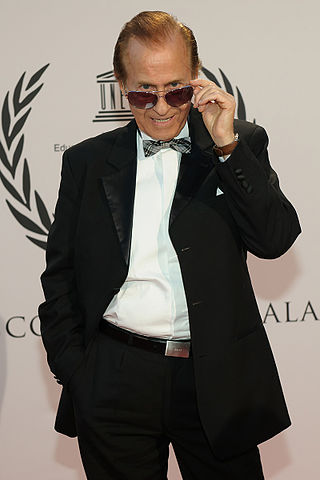
Ernst Klee was a German journalist and author. As a writer on Germany's history, he was best known for his exposure and documentation of medical crimes in Nazi Germany, much of which was concerned with the Action T4 or involuntary euthanasia program. He is the author of "The Good Old Days": The Holocaust Through the Eyes of the Perpetrators and Bystanders first published in the English translation in 1991.

Michael Holm is a German singer, musician, songwriter and record producer. He is primarily known as a singer of Schlager music. Although his first appearance in the hit parade was in 1962, he had his first big hit in 1969. "Mendocino", the German adaptation of a song by the Sir Douglas Quintet, was the biggest selling single that year in (Germany). The record was released in September 1969, reached number three for five weeks, selling over a million copies. Ariola presented him with a gold record in October 1970.

Joachim Witt is a German rock musician and actor.

Ireen Sheer is a German-English singer. She had her first major hit in 1970 with Hey Pleasure Man. She had a top five hit on the German singles chart with "Goodbye Mama" in 1973. She went on to finish fourth at the Eurovision Song Contest 1974 representing Luxembourg, sixth at the Eurovision Song Contest 1978 representing Germany, and thirteenth at the Eurovision Song Contest 1985 representing Luxembourg again.
Manfred Siebald is a German singer-songwriter and lecturer in American studies in Mainz.
Die Flippers were a German Schlager group formed in 1964. They were one of the most successful Schlager groups of all time, and have been constantly recording and releasing new music since their self-titled debut album was released in 1970. They have released 45 albums, 5 of which have gone platinum, 24 gold. They have won 11 Goldene Stimmgabel awards in 1988, 1991, 1994, 1995, 1996, 1998, 1999, 2000, 2002, 2003 and 2004.

Brain was a Hamburg-based record label prominent in the 1970s releasing several important Krautrock records by bands such as Neu!, Cluster and Guru Guru. Many of its more prominent records are currently being reissued on CD by Repertoire Records.
Andrea Elisabeth Maria Jürgens was a German schlager singer. She became famous as a child star in the late 1970s when she had her first hit with "Und dabei liebe ich euch beide" at age 10. She had been active in the music business ever since with more than 60 single releases.

Hanne Haller was a German pop singer, composer, writer, producer, and sound engineer.

Eisbrecher is the fourth and final album by German pop rock band Nena and the fifth studio album of its singer, Gabriele "Nena" Kerner. After the band split the following year, Kerner went on to a solo career. "Mondsong" and the remix of "Engel der Nacht" were released as singles.

Eloy Francois Maurice Gilbert Charles Prosper de Jong is a Dutch pop singer and moderator. He became known in the early 1990s as a member of the English-Dutch boy group Caught in the Act. In 2004, he made a comeback as a solo singer. In 2018, he reached number 1 on the German album charts with his German-language albums.
Reinhold Bernt was a German film actor.
Novalis is the pseudonym of Georg Philipp Friedrich Freiherr von Hardenberg.

Frei.Wild is a German rock band from Brixen, South Tyrol, Italy. Its members belong to the German-speaking population of South Tyrol and their songs are mostly in German.
Habakuk is a German pop band from Frankfurt, formed in 1975. The group is focused on new Christian music of the genre Neues Geistliches Lied.
Tina York née Monika Schwab is a German pop singer. She had her greatest success in 1974 with Wir lassen uns das Singen nicht verbieten.








